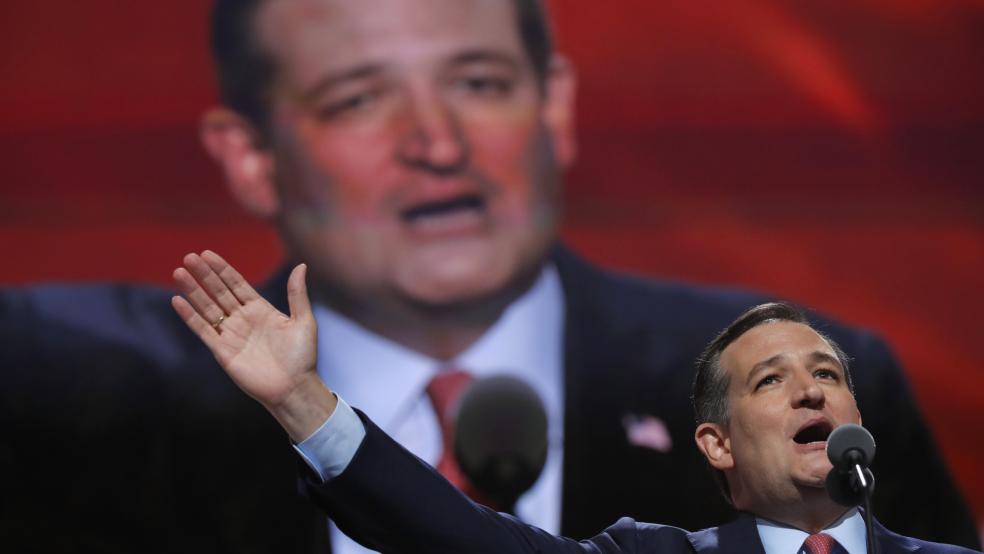On the list of surprising visitors calling on president-elect Donald Trump last week, Senator Ted Cruz of Texas ranks right up there with alleged Secretary of State candidate Mitt Romney.
While Romney who called Trump a “phony” and talked openly about derailing his candidacy during the campaign had an actual job attached to the meeting with his former nemesis on Saturday, Cruz’s visit was billed as more of a drop-by.
Related: Trump and Rubio Gang Up on Ted Cruz
It’s true that after the name-calling between Cruz and Trump (who tagged him “Lyin’ Ted’) during the primary campaign; after Trump’s derogatory comments about Cruz’s wife; after Trump’s suggestion that Cruz’s father had a role in the JFK assassination; and after Cruz neglected to endorse Trump at the Republican National convention, they did in the end come together. In September, Cruz finally endorsed Trump and campaigned for him.
And a year earlier, before the primary season got ugly, Trump and Cruz held a joint rally in Washington to oppose a nuclear deal with Iran. “There is a little romance between us,” Trump told reporters as Cruz was speaking. However, after all that went down, no one can accuse them of being anything more than politically expedient allies – which means there was a reason for Cruz to pop into transition central at Trump Tower.
That reason, a betting person might wager, was the Supreme Court vacancy left by the death of Justice Antonin Scalia.
While the Texas senator’s name does not appear on the list of 21 potential Supreme Court candidates that Trump released at the end of September and that he has called “definitive,” there are at least three factors that argue for a Cruz nomination.
Related: Ted Cruz: It’s Hard Out There When You’re Universally Loathed
- Cruz can be a loose cannon in the Senate, and Trump doesn’t need a conservative firebrand questioning his policy choices. Nominating Cruz to the Supreme Court might please Republican senators who chafe at Cruz’s grandstanding while reassuring conservatives and eliminating a potential rival in 2020. South Carolina Senator Lindsey Graham has clashed with Cruz in the past and said last February, “If you killed Ted Cruz on the floor of the Senate, and the trial was in the Senate, nobody could convict you.” But at a Veterans Day event, Graham said that his fellow member of the Senate Judiciary Committee should be on Trump’s SCOTUS list, adding, “there is no stronger constitutional conservative than Ted Cruz.”
- During the Republican primaries, one of Cruz’s two most generous backers was the Mercer Family, which poured some $13.5 million into efforts to help him win the GOP nomination. When Cruz was ultimately vanquished, the Mercers threw their support to Trump. Now Rebekah Mercer, the activist daughter of hedge fund billionaire Robert Mercer, sits on the executive committee overseeing the Trump transition team – along with Steve Bannon, to whom the Mercers have close ties. It is not unreasonable to imagine that the support of the Mercers, who also urged the hiring of Trump campaign manager Kellyanne Conway, would carry considerable weight.
- The reason that Trump could cite for diverging from his “definitive” list to pick Cruz is simple: He is highly qualified. Harvard Law School Professor Alan Dershowitz has called Cruz one of the most brilliant students he has ever taught, and as the solicitor general of Texas, Cruz argued cases before the Supreme Court nine times.
Ted Cruz Is Kinda Sorta Right About Something
The Republican majority on the Senate Judiciary Committee, which includes staunch conservatives such as Cruz’s fellow Texan John Cornyn, Jeff Sessions of Alabama (Trump’s pick for Attorney General) and Mike Lee of Utah, who is on Trump’s Supreme Court list, could be expected to rally behind Cruz. But he would be in for a fierce grilling from the Democratic minority, which includes liberals such as Al Franken of Minnesota and Sheldon Whitehouse of Rhode Island.
And if Cruz made it past the Judiciary Committee and got to the Senate at large for confirmation, he could face a Democratic filibuster. To shut down the filibuster would require 60 votes.
In short, any battle to install Cruz as a justice of the Supreme Court would be bruising and bloody. But all those on the Right who questioned Trump’s conservative credentials would finally be silenced.





